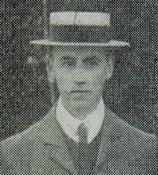
|
The King's School Canterbury |
Roll of Honour |
| District Commissioner Edward Alfred ROPER | |
|
Civilian Date of birth: 4th February 1886 Date of death: 28th November 1917 Killed by enemy action aged 31 Buried at sea |

|
| He was born at Croydon on the 4th of February 1886 the elder son of Henry Alfred Roper, wholesale tea and coffee merchant, and Kate (nee Berney) of 27 St Saviour's Road, St Leonards on Sea. He was christened at Croydon on the 14th of April 1886. He was educated at the King's School Canterbury from September 1898 to July 1905, where he was granted a Junior Scholarship in December 1900 and a Senior Scholarship in July 1902. He was appointed a monitor in September 1903 and Captain of School in September 1904. He was Editor of The Cantuarian and President of the Debating Society in 1904. He won his sports colours in 1904 and 1905, holding the record for the half mile, which he won in a time of 2 minutes 8 1/2 seconds. He won an open classical scholarship to Queen's College, Oxford, where he gained a 2nd Class honours degree in 1907 and a 2nd Class Lit Hum in 1909. He was president of the Queen's College Sports Club in 1907 and in the college boat in 1908. He took up teaching in 1908 but in 1911 he was appointed as Assistant District Commissioner in Sierra Leone and in 1914 was appointed to District Commissioner. On the outbreak of war he offered to resign this position and take up a commission but his work was considered too valuable to be relinquished. He repeated his request on a number of subsequent occasions but all were refused. Edward Roper was returning on leave on board the defensively armed Elder Dempster liner SS Apapa, which had set sail from Lagos on November the 3rd bound for Liverpool. She stopped to pick up passengers at Freetown on the 14th of November and joined a convoy of nine other vessels escorted by destroyers but these left her at 6.30pm on 27th of November she was on her own. On the night of the 28th of November was a clear moonlit night and she had just passed the Middle Mouse on her starboard bow at 4.10am steaming at 13 knots when she suddenly shook from stem to stern. Many passengers were thrown from their bunks and it was obvious that she was sinking. She had been hit by a KIII torpedo fired from one of the stern tubes of the German U Boat U96 commanded by Lieutenant Commander Jess which was just 300 metres behind the Apapa when the torpedo was fired. At that time she was still on an even keel and the Captain, Captain James Thomas Toft, ordered the engines to be stopped. Close examination showed that a torpedo had ripped a huge hole in the starboard side towards the stern of the ship, and Captain Toft then ordered that the boats should be lowered. As the lifeboats were being loaded, a man was seen disappearing down a companion-way. His mission was one from which he never returned. His name was Mr. Harragin, of the Gold Coast Customs, and he was coming home with his wife to spend a well-earned rest in England. She was lying in their cabin, ill with black-water fever and he tried to carry her on deck, but she declared herself too ill and too weak to be moved. And so he stayed with her - just two of the forty passengers who lost their lives. By this time many of the passengers were safely in the lifeboats and the ship had developed a list to starboard. Suddenly, there was a streak in the water and a second torpedo hit the ship, again on the starboard side but this time further forward. Some of the lifeboats were swamped and the ship lurched to starboard. As she did so, the stays supporting the funnel snapped and the funnel collapsed, falling onto a lifeboat that was loaded and was just about to be lowered into the water. It was this second torpedo that contributed to the large number of casualties. A few moments later the ship plunged stern first to the bottom of the sea. There were 249 persons on board the vessel at the time but Edward Roper was one of the 40 passengers and 37 crew who lost their lives. An Oxford friend wrote that he was a born fighter and, the many who knew and loved him, have the consolation that he met his end as gamely as he lived. |
|
Back